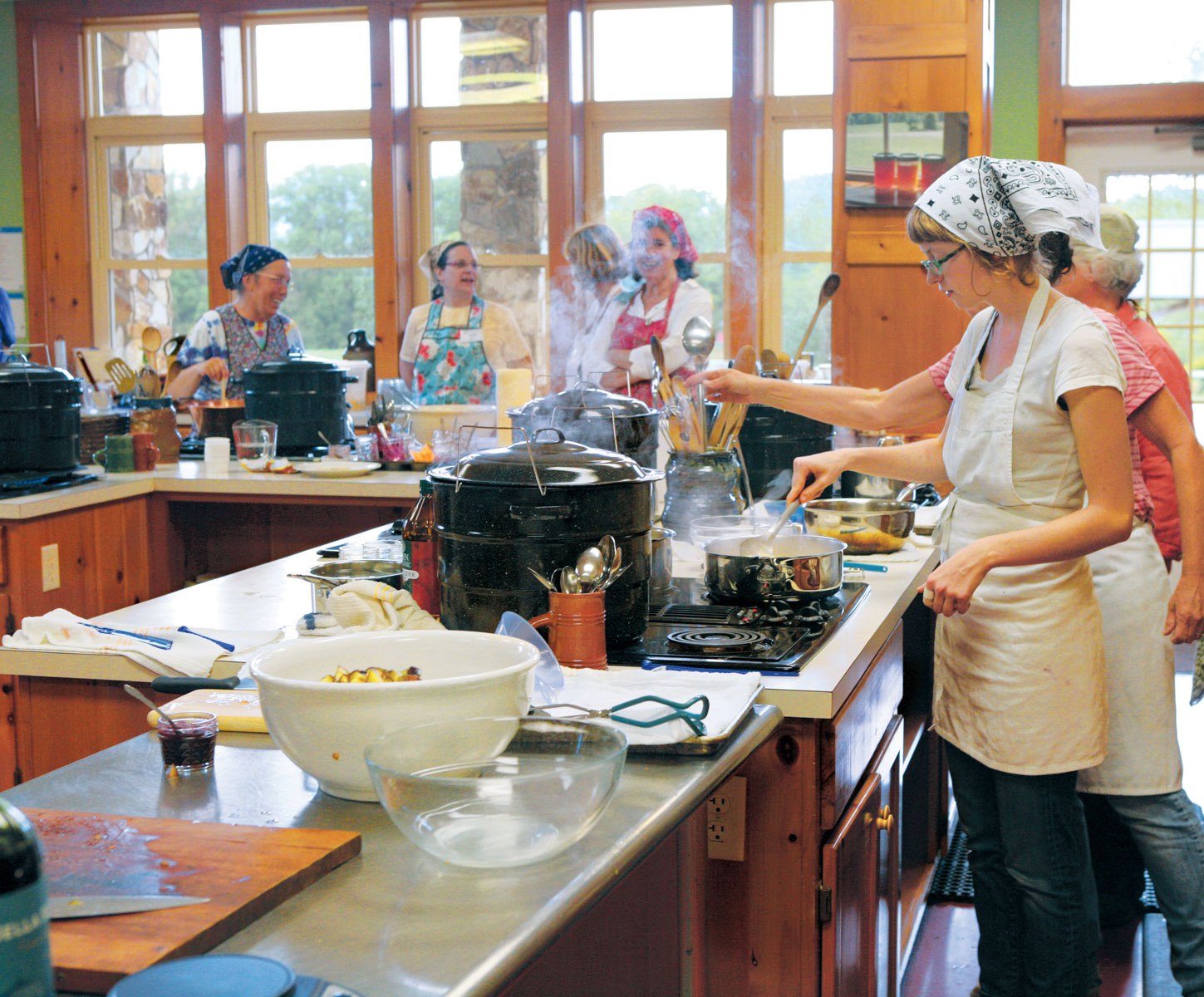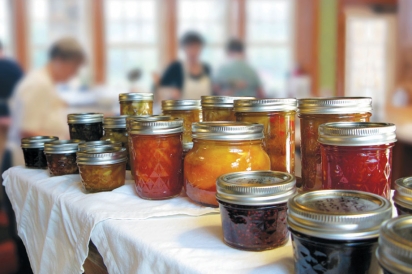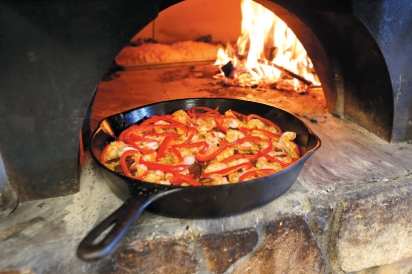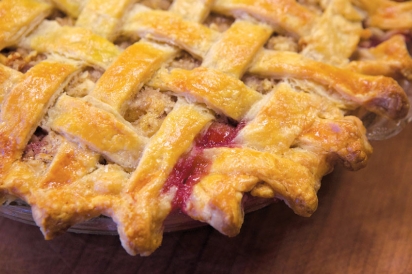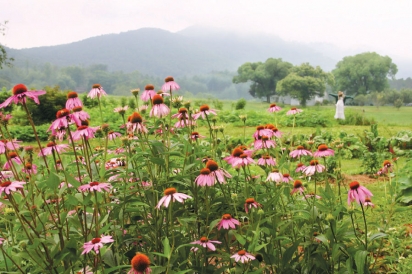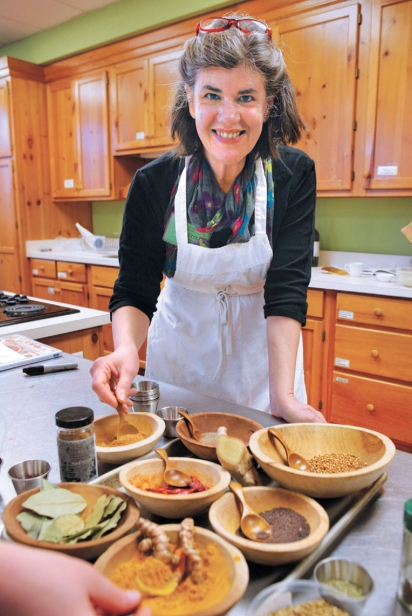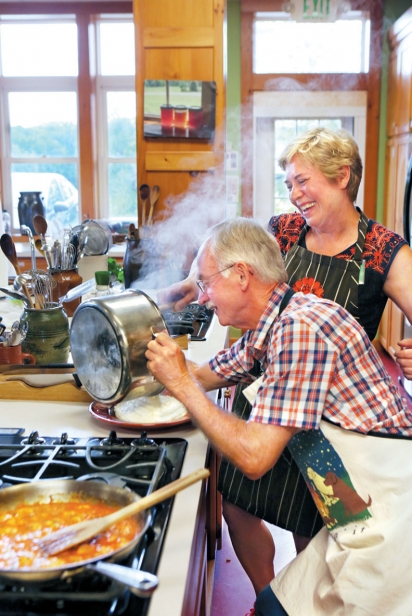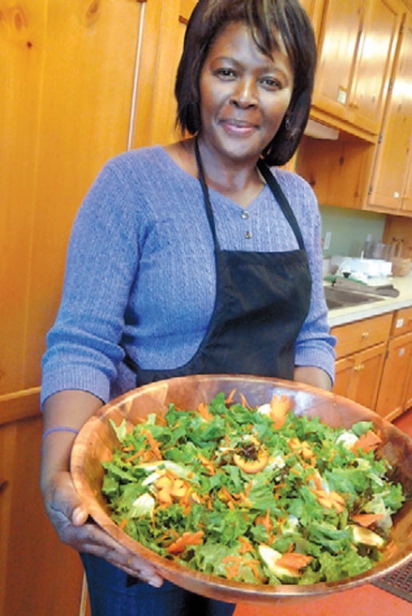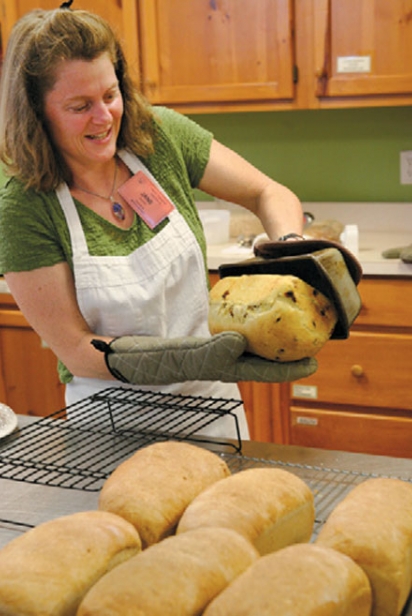Craft Cooking In the Folk School Kitchen
Brasstown’s folk school is known for crafts like blacksmithing and weaving, but it’s not just a place for those who want to practice an uncommon trade. You can also learn how to cook.
I’ve taught cooking at The John C. Campbell Folk School for seven years and it never gets old. Its magic emerges in part from the woodland campus and the student community, from the instruction and activities and for sure a big part of the experience occurs over family-style meals and a daily ritual aptly named Morning Song. A week at “The Folk School” offers adult students a chance to take a breath and inwardly assess (while working their faces off at their chosen crafts).
To clarify a few common misconceptions, The John C. Campbell Folk School is a residential school for adults attended a week at a time. Kids are rarely invited to learn here because it’s simply not the reason for the place. There are no credits, certifications, or rankings. You travel here to learn for the sake of knowing how, from excellent, generous instructors. And, there is no art. Art implies talent, which is also unnecessary here. Craft is for the diligent, and curiosity is a currency valued much more than natural ability on campus in Brasstown, North Carolina.
There are three preeminent schools of craft in the US: The John C. Campbell Folk School, Penland School of Crafts (also in North Carolina) and Arrowmont School of Arts and Crafts (in Tennessee), but only The Folk School recognizes cooking as craft. Nanette Davidson founded the culinary studio 20 years ago to provide expanded offerings for spouses and travel partners.
“Cooking is a craft in the most literal sense of the word,” says Davidson. “Most crafts exist to support it—ceramics, basketry, blacksmithing, broom making, wood turning, it just goes on—and though there’s a bias against cooking as craft by some, we openly help people embrace the craft-ness of it.”
The school began in 1925 as a farm school serving just a few dozen students who would stay and learn for up to nine months before returning to pastoral life. They taught cutting-edge farming techniques and crafts that could enhance lifestyle and income such as carving, whittling and weaving.
There were good seasons and lesser ones as the school reinvented its reason-for- being over the decades. Nannette’s husband, Jan Davidson, took the helm as Executive Director in 1992 and grew Folk School attendance to nearly 6,000 annually. Upon Davidson’s retirement last year, Jerry Jackson (Deputy Director of Penland) came aboard to fill the distinguished position.
Hearth cooking was one of the first classes taught in the kitchen studio. It was a natural extension of a booming blacksmithing program at the Folk School and the kitchen was designed to serve both historic and contemporary methods. Today there are indoor and outdoor wood-burning hearths, multiple grills, six complete burner stations, four wall ovens and convection pastry ovens to boot. Every drawer, cupboard and cabinet is labeled with its culinary contents. The walk-in pantry alone is a place to behold. Just outside the door sits a complete herb garden and a biodynamic vegetable micro-farm.
“We never wanted the studio to be a commercial kitchen. We wanted it to be a home kitchen because our students are home cooks and that’s how they’ll further their skills,” says Davidson.
What started out as four offerings quickly jumped to 15 classes and now 42 with more in the works. Davidson teaches several times per year and counts her class total at 60+ (one of these days I’ll take her bread and jam class). Artisan food crafting is currently a popular category featuring charcuterie, cheese making, chocolate, fermented foods, bread science and craft beer. International cooking classes fill quickly too. This year there’s instruction on specific regional cuisine of Italy, India, France and Asia. Chef Patrick O’Caine from Gan Shan Station in Asheville is also on tap to teach his phenomenal dumplings.
The Lost Art of Pie Making is the studio’s most popular class (well, who doesn’t yearn to bake a perfect pie?) and quirky offerings such as Recreating the Meals of the Titanic keep the ever-rotating catalog approachable. What holds the coursework together is a simple food philosophy, a tenant of sorts: to teach students to cook from scratch.
“Many of us share a passion to make things with our hands everyday,” says Davidson. “Preparing a meal from scratch can fill that need. Let cooking be part of your creative time.”
Even after two decades Davidson believes she always learns things from her students. I agree. For me, teaching adults to cook in the Folk School environment is a joy, one I’m grateful for each year. Observing my students serve with ease a dinner party for 16 is gratifying, but watching an inexperienced cook slice an onion with ease at the end of a week is something you take home with you, like a gift, knowing a kitchen will be forever changed.
“I think that’s part of what makes the Folk School different. The folk part of it is about people. Recognizing that everybody has something to bring to the group. The teacher is simply the catalyst for that to happen. It’s about helping everyone find their comfort zone and because we’re not competitive it makes it a whole lot easier to share,” says Davidson. “We’re the best at not judging.”
What can you look forward to in the Folk school kitchen?
“Students get to learn something new, things they’ve never tried before, possibly with equipment they’ve never had the opportunity to use,” says Nannette Davidson. “I would want to expand my level of technique and here you have multiple days to work on a legitimate skill. I hope the Folk School is not just about entertaining people but learning something that they didn’t think they could do.”


